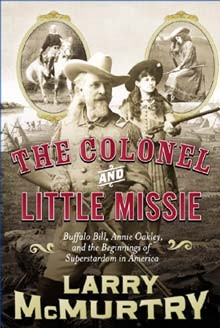Larry McMurtry's tale of Annie Oakley and Buffalo Bill leaves Little Miss Sure Shot out of focus
Long before someone taught George W. Bush how to walk and talk like a Texan, performers have been selling the Wild West mythology to Americans. Tales of cowboys and Indians spawned entire libraries of westerns and dime-store novels. Many of which trace their roots back to Buffalo Bill's Wild West show.
Although this is a large claim, there is plenty of evidence to suggest McMurtry is not far off the mark. Cody was a superstar in an era when only presidents and royalty could lay claim to audiences as large as his own. Indeed, Teddy Roosevelt named his Rough Riders after Buffalo Bill's show and not the other way around. Mark Twain and P.T. Barnum were also fans, and Generals Sherman and Custer testified to the show's realism.
It wasn't just Americans who were smitten with the Wild West, McMurtry reminds us. Cody played around the world, for everyone from Kaiser Wilhem to Queen Victoria, who emerged from 26 years of mourning for her beloved Albert to exclaim that, "I have seen all kinds of people; but today I have seen the best looking people I know. If you belonged to me, I would not let them take you around in a show like this."
A big part of Bill's appeal, of course, came from the fact that he traveled with "Little Miss Sure Shot," Annie Oakley, who spent 16 years with Cody's show but remained something of an enigma throughout her career. She was born Phoebe Ann Moses, grew up in Drake County, Ohio, and named herself after a district in Cincinnati before hitting the road.
While Annie Oakley's celebrity came through transformation, Bill's came from his ability to recall the myths of his pre-stage work as a scout, hunter, and occasional Indian fighter. This led to an act of pure fiction. "She always addressed him as Colonel, the rank he had more or less adopted for himself," McMurtry writes, "and he always called her Missie, though she was married for more than 40 years. Annie Oakley liked her privacy, and Cody, as we'll see, never quite knew what to make of any woman, Annie Oakley included."
| The Colonel and Little Missie: Buffalo Bill, Annie Oakley, and the Beginnings of Superstardom in America By Larry McMurtry Simon & Schuster $26, 245 pages ISBN: 0743271718 |
By contrast, Oakley doesn't get nearly so close a treatment, in part, one supposes, because she was so very private. About the only details that surface about her concern the startling accuracy of her shot, and the vigor and youth of her performance. As a result, The Colonel and Little Missie is tipped strongly to Buffalo Bill's story. His excesses and gestures of generosity tend to dominate, sometimes crowding out even McMurtry, who rarely steps back to explain the cultural significance behind an event.
In fact, all too often McMurtry simply lets the anecdotes stand on their own, rather than tell us why this version of idealized history played so well abroad, and even in the West itself. It seems no accident that, as historian Frederick Jackson Turner claims, the frontier closed in 1893, by which time Cody's show was "grandly titled" Buffalo Bill's Wild West and Congress of Rough Riders.
Why did this nation retreat into fantasy? How have these myths shaped America today? McMurtry has addressed these questions in nearly 30 novels and several screenplays, restoring some of the complexity and dignity to the so-called Wild West. It remains a mystery, however, why he did not take them up here. •


